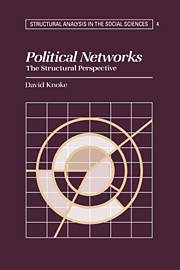Book contents
- Frontmatter
- Contents
- List of tables and figures
- Preface
- Acknowledgments
- 1 Politics in structural perspective
- 2 Voting and political participation
- 3 Social movements (written with Nancy Wisely)
- 4 Organizational power (written with Naomi J. Kaufman)
- 5 Community power structures
- 6 Elites in the nation state
- 7 International relations (written with Jodi Burmeister-May)
- 8 Toward a structural political economy
- Appendix: Some fundamentals of network analysis
- References
- Index
1 - Politics in structural perspective
Published online by Cambridge University Press: 02 October 2009
- Frontmatter
- Contents
- List of tables and figures
- Preface
- Acknowledgments
- 1 Politics in structural perspective
- 2 Voting and political participation
- 3 Social movements (written with Nancy Wisely)
- 4 Organizational power (written with Naomi J. Kaufman)
- 5 Community power structures
- 6 Elites in the nation state
- 7 International relations (written with Jodi Burmeister-May)
- 8 Toward a structural political economy
- Appendix: Some fundamentals of network analysis
- References
- Index
Summary
Almost all political analysts are unwitting structuralists, because they define social power primarily in relational terms. Power is not a property or attribute that is inherent in an individual or group in the way that an electrical battery stores so many volts of energy. Rather, power is an aspect of the actual or potential interaction between two or more social actors. (Actor is a generic term for a unitary social entity, whether an individual person or a larger collectivity, such as a corporation or a nation state.) Most formal definitions of social power explicitly indicate this relational dimension. For example, Bertrand Russell wrote of power as “the production of intended effects” (Russell, 1938: 25), which Wrong modified to “the capacity of some persons to produce intended and foreseen effects on others” (Wrong, 1979: 2). Similarly, Max Weber's two famous definitions of power (Macht) underscored the coercive aspect of relationships between two or more actors:
‘Power’ is the probability that one actor within a social relationship will be in a position to carry out his own will despite resistance, regardless of the basis on which this probability rests.
(Weber, 1947: 152)We understand by ‘power’ the chance of a man or a number of men to realize their own will in a social action even against the resistance of others who are participating in the action.
(Weber, 1968: 962)- Type
- Chapter
- Information
- Political NetworksThe Structural Perspective, pp. 1 - 28Publisher: Cambridge University PressPrint publication year: 1990
- 2
- Cited by



